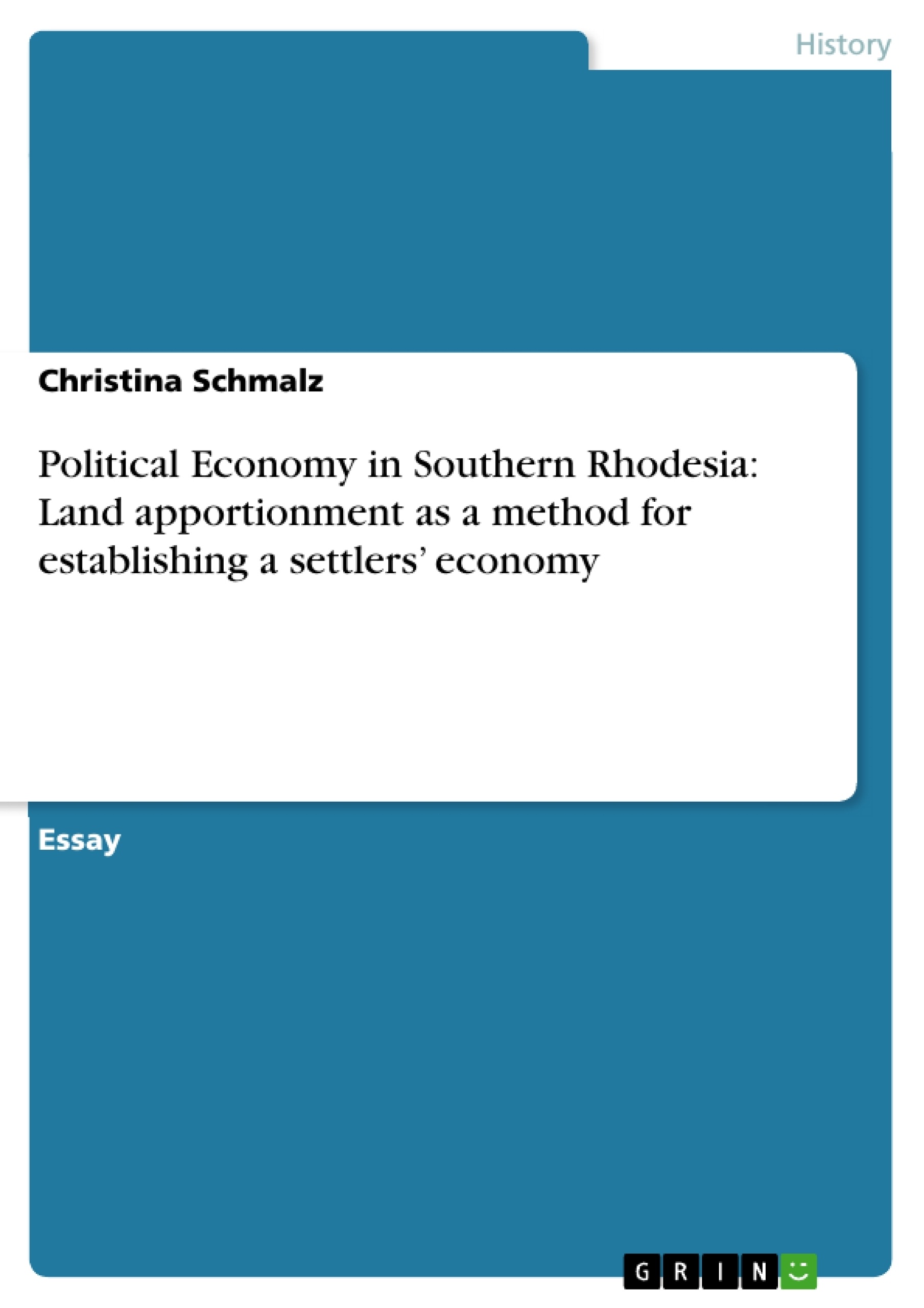Excerpt
Content
I Introduction:
II Economic and social background:
III Charter Rule 1890-1923:
1) Cecil Rhodes and the British South African Company:
2) Social and political development:
IV Self- Responsible Government: 1923-1930
1) Political system and legislation:
2) Land Apportionment Act (LAA):
3) The Great Depression:
4) Effect on the country’s economy:
V Bibliography
I Introduction:
A settler society, as we find it in Southern Rhodesia, is characterized as a country partly settled by European landowner-producers who have a share in the government but remain a minority of the population and remain dependent, at least for labor, on the indigenous population.[1] Reorganising land ownership as a basic element in the implementation of state policy, over a period of several decades land was alienated in Southern Rhodesia for the use of white European settlers who then established a dual economy and a so called two pyramid system of society. According to Mosley, the decision to settle a white agricultural population on the land of Southern Rhodesia had set up three separate conflicts concerning how the land market should be managed: 1) between African and European producers over the ultimate ownership of the land, 2) between government seller and incoming buyer over the price of land and 3) between one type of European producer and another over the use of land.[2]
In this essay, I will have a look at the development of Southern Rhodesia that led to the installation of a settler economy and the different factors that played a role in it, always with special reference to the land rights.
II Economic and social background:
Southern Rhodesia is an entirely landlocked country. It lies within the tropics and covers an area of 150,000 square miles. The country is a relatively high region with the central plateau called High Veld as its main elevation. Between one half and two thirds of Southern Rhodesia is higher than 3,000 feet above sea level. The soils are predominantly sandy (cover about 70% of the country) whose fertility is low. The country lies entirely in the tropics. Rain is erratic and inconsistent. Its distribution is uneven (higher in the eastern part, declining in the western and southern regions). Woodland vegetation[3] occupies the major portion of Southern Rhodesia. As a result of these facts, only 20 percent of the land are suitable for intensive crop cultivation and about 15 percent are suitable for extensive cattle ranching. The rest two thirds of the land are subject to uncertain wheather conditions.[4]
III Charter Rule 1890-1923:
1) Cecil Rhodes and the British South African Company:
As Southern Rhodesia was thought to be rich of gold, prospectors entered Matabeleland at the end of the 19th century to search the land for minerals and were followed by the settlers. King Lobengula of Matabeleland gave several concessions to the European fortune seekers. The most important concession was given to Cecil Rhodes, a Cape Colony politician and mining magnate, and his British South African Company (BSAC). Primarily giving mineral rights, the concessions also opened the way for European conquest and settlement. Rhodes then used the concession to obtain a royal charter from the British government authorizing his company to exploit the mineral wealth of Southern Rhodesia. The Charter was gazelled in 1889. The BSAC was given the right to settle and administer an unspecified area. It was granted wide powers relating to government and commerce such as the authority to preserve law and order, to make ordinances, subject to the approval of a secretary of state for the colonies , and to establish and maintain a police force. The British decision against direct administration had to do with two aspects: 1) it did not want to become financially involved in the task of administering and 2) it was expected that Rhodesia would eventually join a larger white-run South African federation or union. The only British official in Rhodesia was the resident commissioner, a fact that, according to Bowman, left the settlers free to shape their own political practices and institutions.[5] The first act of market penetration to ensure white supremacy then was to restrict the market as the means by which land should be transferred into the hands of incoming European settlers. Farms and prospecting rights were given to the Pioneers and large blocks of land were set aside for companies and syndicates.
It soon turned out that the company’s expectations of obtaining rich returns from mining were not realized. Facing rising costs[6] it decided to capitalize its greatest asset – land. The least- cost means were seen in forcing development by granting large-scale monopoly concessions of land to white immigrants. The concessions were large and cheap and represented only initial allocations, as to say that the settlers were free to accumulate more land in the future.
[...]
[1] Mosley Peter,The settlers economies. Studies in the economic history of Kenya and Southern Rhodesia 1900-1963, Cambridge, Cambridge University Press, 1983, pp. 3-5
[2] Mosley, p.20
[3] One of the major formations of tropical savannah.
[4] Facts taken from Yudelman, pp. 29-33
[5] Bowman L.W.,Politics in Rhodesia: White power in an African State, Cambridge / Massachusetts, Harvard University Press, 1973, p. 6
[6] One of the conditions for obtaining the charter was to bulit a railway.
- Quote paper
- Christina Schmalz (Author), 2004, Political Economy in Southern Rhodesia: Land apportionment as a method for establishing a settlers’ economy, Munich, GRIN Verlag, https://www.grin.com/document/73203
Publish now - it's free






















Comments